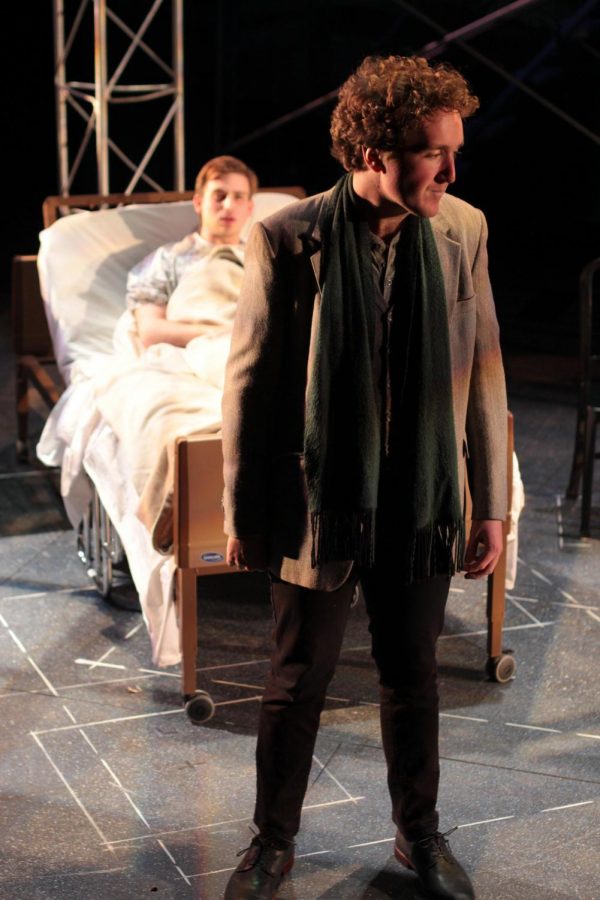Tony-Winning AIDS Epidemic Epic Remains Relevant
Photo Courtesy of John Seyfried
Tony Kushner’s Angels in America: A Gay Fantasia on National Themes, Part One: Millennium Approaches opened in Hall Auditorium Thursday night. The play explores human nature and queer identities in a series of interconnected narratives set in 1980s New York.
Angels in America: A Gay Fantasia on National Themes, Tony Kushner’s Pulitzer Prize and Tony-winning two-part play celebrates its 25th anniversary, and the first part of Oberlin’s production opened last night in Hall Auditorium. The play focuses on the interconnected stories of a number of queer characters and their loved ones living in 1980s New York, and its themes are thrown in sharp relief by the current political climate. Angels in America offers a stark, intense, and moving exploration of human nature.
The play is divided into two parts, each a full-length show — Millennium Approaches, which opens at the end of October 1985 as Louis Ironson learns that his boyfriend, Prior Walter, has AIDS, and Perestroika, which returns to the story again in December of that year. Angels in America also follows the stories of several other characters: a closeted gay Mormon named Joe; Joe’s wife Harper; McCarthyist lawyer Roy Cohn, who is also closeted; and Belize, a drag queen and a friend of Prior’s who works as a night nurse at a hospital. While the parts are often performed independently, Director and Professor of Theater Matthew Wright was determined to stage both parts concurrently this semester, presenting Angels in America in its full seven-hour length with the two parts performed on alternating days.
“To me, the story is not complete unless you see the whole arc of the narrative,” Wright said. “Part one ends, [and] there’s a real question about what’s going to become of these people. And so I was determined that if we were going to do it, we were going to do the whole damn thing.”
For these performances, the parts are double-cast, with each character played by one actor in Millennium Approaches and another in Perestroika. This decision not only addresses issues of feasibility, but also creates some beautiful effects. When the characters first appear onstage, they are shadowed by their double, who mirrors their actions and gives the actor performing one of their distinctive costume pieces before removing themselves from the set. It is a striking bit of choreography. The doubles for each production also participate in the scene changes, so the audience constantly feels their presence.
“You really get to see the ways in which the characters change,” Wright said. “They change quite literally physically in this production, and it was cast with that notion in mind. There was intent behind why this particular cast of actors plays Part One and this particular cast of actors plays the second part. So that’s an innovation.”
Wright also cast four actors — rather than the traditional one — to play The Angel, who first appears to Prior in his dreams and manipulates and interacts with him and the other characters throughout the story.
“The Angel is this infinite aggregate myriad entity, basically comprised of a bunch of different consciousness and ideas,” said College first-year Daniel Fleischer, who plays Louis in Perestroika. “So there are four people playing the angel, and in this production, the angels are instrumental in conducting the characters’ behaviors. They guide the characters during the scene transitions, and there are a lot of peripheral characters that … are played by The Angel. They’re supposed to be representations of The Angel taking physical form and guiding these characters.”
The staging of this production is sparse and stunning; the set is almost entirely made up of plain scaffolding. The staging is clearly in line with the playwright’s intentions, as Kushner specifically indicated that Angels in America should be performed in a pared-down style with no blackouts to highlight the show’s theatricality.
“[Kushner] talks about … the theatrical seams showing,” Wright said. “And we took that quite, quite seriously in this production, so that there’s nothing slick about it. It takes place on scaffolding — there’s a reason for that, too, that being that we think the play is largely about the notions about construction, deconstruction, reconstruction. The notion of putting the play on scaffolding was, I thought, a really interesting and innovative idea. I don’t know that it’s ever been done that way before. And the theatricality is exposed. We call a piece of scaffolding a desk and it becomes a desk. … So it gives us a lot of license, and we don’t try to create all these locations with a realistic brushstroke, except for a few certain terribly important artifacts like a hospital bed, Louis and Prior’s bed, and Harper’s sofa.”
One particularly striking narrative arc in the play belongs to the character of Roy Cohn, a lightly-fictionalized version of a real person who may be best described by his square on the Names Project’s AIDS memorial quilt, which reads “Roy Cohn: Bully, Coward, Victim.”
“Roy Cohn [was] a prominent lawyer in New York City in the 70s and 80s who worked for the mob and for Donald Trump,” said College senior William Osborn, who plays Cohn in Millennium Approaches. “He held a staggering amount of political power during this time. He was also responsible for the executions of Julius and Ethel Rosenberg in 1953. He was a closeted gay man who hated the homosexual identity because of how people viewed it — effeminate, marginalized, everything that Roy Cohn was not. He is diagnosed with AIDS in the play, as he was in real life.”
Although the play is nominally a period piece, it is also fiercely contemporary. At a time when the government is actively trying to roll back protections for queer people on many fronts, Angels in America may be more relevant, in some ways, now than it was 25 years ago.
“To me, the story is timeless,” Wright said. “I think that we hear conversations … that could be happening in [Stevenson Dining Hall] today. It’s still relevant. The intersection of race and sexuality, the intersection of religion and sexuality, the intersection of ageism, of right versus left, of progressive politics versus regressive politics — these are all issues that are still resonant for us, and in some way, more resonant than they were when Tony Kushner wrote about them. They’re more in our face now. And to me, what’s interesting is that watching it, being a man of my generation and having been traumatized by that era in my life, I can’t get over how prescient Tony Kushner was about the politics of it all.”
Of course, a lot has changed since the 1980s, particularly in terms of the treatments available for HIV and AIDS and research on their prevention. In 2017, The Lancet found that HIV-positive people on antiretroviral therapy have life expectancies that are almost as high as those of HIV-negative people. On National Gay Men’s HIV/AIDS Awareness Day last September, the CDC released a statement affirming that if the amount of HIV in an HIV-positive person’s blood is undetectable, then it is untransmittable to an HIV-negative partner. And pre-exposure prophylaxis, or PrEP, has been developed as a preventative medicine for people at high risk of contracting HIV.
“When this was first put on, AIDS was a death sentence,” said College junior Kieran Minor, who plays Louis in Millennium Approaches. “When you were diagnosed with AIDS, people at the time only had the faintest understanding of how it was transmitted. It was still a mystery. It was known as ‘the gay plague,’ and no one really knew what was going on. People thought it was God smiting people for a certain lifestyle. And there was a lot of fear. There was so much fear, and this play presented such a radical sense of hope. And today, obviously, living with AIDS is not a death sentence. It’s chronic, but you can live with it.”
Although Angels in America switches between scenes, locations, emotions, and narratives at a breakneck pace, the narratives are grounded by a persistent, unrelenting sense of hope — both for these characters, and for the future of humanity at large.
“While it is compelling, and sometimes angering, and sometimes really funny, and sometimes desperately sad, the play, to me, offers a vast message of hope,” Wright said. “It’s delivered very clearly in Prior’s last monologue, but it’s so much a message of, ‘Rise up, be heard, move forward.’ Move in any direction. But don’t spin backwards. The world doesn’t spin backwards. It only spins forward, so be part of the forward momentum. And I think that that is the message of the play. And I think that that message is universal, and I think — while it is ‘a gay fantasia on national themes’ — I think the play is accessible to everyone, regardless of their identity. I think it tells an important American story. So, hope. That’s what it’s about.”








